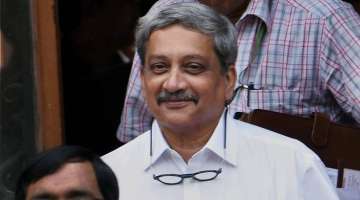India a victim of 'proxy war,' says Parrikar; calls for adoption of anti-terror convention by UN
Defence Minister Manohar Parrikar was speaking at a conference on combating terrorism at the Institute of Defence Studies and Analysis .

Terming terrorism the single biggest threat to international peace and security, India today renewed its pitch for early adoption of a global convention by the United Nations to effectively combat the menace.
Defence Minister Manohar Parrikar, speaking at a conference on combating terrorism at the Institute of Defence Studies and Analysis on Monday, called for a global action on the issue and stated that India would continue to push for action under the ambit of the UN.
"Terrorism is undoubtedly the single biggest threat to international peace and security. While the threat is transnational, response does not appear to be coordinated even though there is a broad consensus on what constitutes an act of terror," Parrikar said.
In a veiled but obvious reference to Pakistan, Defence Minister Manohar Parrikar said India has been a victim of "proxy war" for several decades and that there was a need for developing an Asian approach to push the global fight against terror networks.
Calling for early adoption of India-backed Comprehensive Convention on International Terrorism (CCIT) by the UN, Parrikar said terror remains the "most pervasive and serious challenge" to international security and an united approach to deal with it was very important.
The Defence Minister said there must be action against entities which fund terror groups, propagate their ideologies and provide safe havens to terror groups and added that India has been seeking inclusion of these provisions in the CCIT.
Talking about issues relating to global security, Parrikar also mentioned about challenges like global uncertainty, revival of populist movements, heightened nationalism, backlash against globalisation and possible closing of borders by several countries.
The minister said Asia has been victim of some of the most dreaded terrorist networks and a strong regional push from Asia will exert more pressure on rest of the world to adapt a cohesive framework to combat terror.
Without giving specific details, he said India experienced almost seven per cent of the total terror attacks globally.
"Terrorism remains the most pervasive and serious challenge to international security. Developing a serious and cognitive global response to it is very important but seemingly very difficult to achieve," he said.
Parrikar said India will continue to push for shutting down terror camps, imposing ban on all terror groups, prosecuting all terrorists under special law and making cross-border terror an extraditable offence under the CCIT.
"Terrorism is undoubtedly the single biggest threat to international peace and security. While the threat is transnational, response does not appear to be coordinated even though there is a broad consensus on what constitutes an act of terror," he said.
He said the arch of terrorism was expanding in Asia and there was a need for a regional approach to defeat terror.
Quoting a global report, he said record number of countries have been experiencing a high level of terrorism which surged by 6 per cent in 2016 over the preceding year.
Four groups--ISIS, Boko Haram, Taliban and Al-Qaeda--were responsible for 74 per cent of all forms of terrorism, he added.
Referring to a UN report, he said ISIS affiliated groups carried out attacks in 29 countries in 2016 which is almost double in comparison to 2014.
He said some 60 million people have been impacted by conflict and violence.
Parrikar also emphasised on the need to combat "complicated webs of terror financing", noting that a holistic approach is needed to combat terror effectively.
He said it is also important to counter the misuse of the Internet through social media by terrorist entities.
"The global response to terrorism will be effective if there is a regional consensus on issues affecting the countries involved. The role of Asia here is central," he said.
"Afghanistan and India have been victims of this proxy war for decades now," Parrikar said. Speaking at the conference, National Security Adviser of Afghanistan Hanif Atmar, in an oblique reference to Pakistan, said there is a need to end state sponsored terrorism.
"Despite international investment in countering it, terrorism is growing its capabilities and presence in our region," he said.
Atmar said Afghanistan considers terror outfits LeT and JeM as enemies and that Pakistan should never allow them sanctuary.
"We share the region with Pakistan which has the highest concentration of terrorists anywhere," he said.
The Afghan NSA said as it was difficult to designate any country as a state sponsoring terror, individuals sponsoring terrorism should be designated.
He said India is a very important partner for Afghanistan and compared its bilateral ties with that of its relationship with the US and the NATO.
(With PTI inputs)